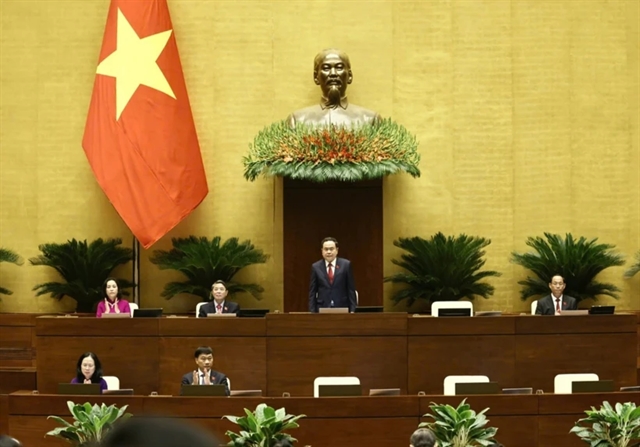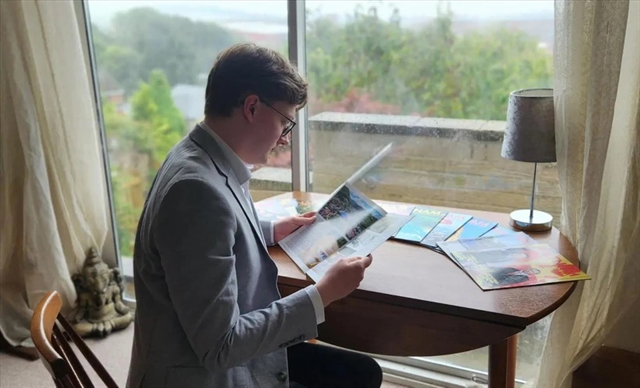 Politics & Law
Politics & Law

 |
| Kyril Whittaker, British researcher of Vietnamese politics and history and member of the Communist Party of Britain. — VNA/VNS Photo |
LONDON — Socio-economic and foreign relation achievements provide foundations for Việt Nam to enter the “Era of the Vietnamese Nation’s Rise” mentioned recently by Party General Secretary Tô Lâm, said Kyril Whittaker, British researcher of Vietnamese politics and history and member of the Communist Party of Britain.
In a recent interview granted to Việt Nam News Agency in the UK, Whittaker said carrying on with the all-rounded development of Việt Nam’s economy, living standards, and environmental protection, the country is well on the road to achieving its target of becoming an upper middle-income country by 2030.
Praising Việt Nam’s economic achievements, the British researcher pointed out that since the country’s adoption of Đổi Mới (renewal) policy in 1986, the economy has now increased 96 times.
Việt Nam has also been developing infrastructure at a rapid pace and, to this end, has seen a successive and rapid implementation of project after project across the country, he said, citing public transport with the development of metros in Hà Nội and HCM City, and the Government’s recent announcement to fund the development of a North-South high speed rail project, placing Việt Nam in the forefront of clean, quality public transport.
The rapid implementation of infrastructure projects has brought about major changes in cities and provinces nationwide, the researcher noted, pointing to new roads, buildings, skyscrapers, schools, houses, hotels, banks, and shops having been built in Cần Thơ just one year after he returned to this city, where he used to live and work.
Alongside this, and part and parcel of this process has been the astounding development and rapid pace of Việt Nam’s poverty alleviation, which has been liberating the Vietnamese people from poverty at a breakneck pace, he said, citing the Government’s target of fully eradicating all temporary and dilapidated housing by the end of 2025.
He went on to say that reconstruction after natural disasters has also been at a rapid pace to house people and ensure their safety, security and wellbeing. He cited the recent September landslides in Làng Nủ which wiped out neighbourhoods, destroying houses and livelihoods. Yet at the beginning of November, the structures of brand-new houses, schools and cultural centres could be seen, dotted on the landscape, built according to local architectural customs with construction expected to be completed by the end of the year.
According to the researcher, this is the result of the Party’s policies and programmes on alleviating poverty and improving people’s living standards which stretch back all the way to 1945, when the first national-level campaigns were established by President Hồ Chí Minh to help the people and the country, such as the literacy campaign, the campaign on sacrificing one meal a week for the poorer families, and more.
Whittaker also highlighted Việt Nam’s major environmental achievements, elaborating that in the last two decades, the country’s forest coverage has expanded by 56 per cent as well as the protection of forests and endangered species and the continued development of a green and responsible agriculture. In big cities like Hà Nội, public transport is in the green transition with buses being replaced with electric vehicles.
With regard to human rights and people’s right to develop, he believed human rights are not only protected but fully developed to the highest potential in Việt Nam, which has one of the highest participation rates of women in its labour force and its parliament. In terms of labour representation, the various unions, paired alongside impressive labour legislation, especially on women’s workplace rights, put Việt Nam as some of the most impressive in the world, he believed.
In terms of religious freedom, Việt Nam has beautiful temples, churches and other places of faith, which are well attended and maintained and are parts of the communities, the researcher said, adding he was impressed by the scale, beauty and roles in the communities of churches, temples and mosques he has visited.
He said these clearly show not only Việt Nam’s strong human rights legislation, but also its deliberate focus on ensuring that the rights the people are given are actually exercisable as stated by late Party chief Lê Duẩn: “Our state not only recognises the citizens’ rights, but also allows the necessary material conditions for their enjoyment.”
Commenting on Việt Nam’s foreign relations, Whittaker said the country has been broadening its cooperation with other countries around the world.
He cited General Secretary Tô Lâm’s inauguration speech where he discussed how Việt Nam would continue “contributing to promoting and deepening the relationship between our country and other countries, especially neighbouring countries, traditional friends and major countries”. This means increasing trade with partners such as China and the US while enhancing projects in exchange with traditional comrades and friends like Laos and Cuba.
The researcher added Việt Nams has also taken an active role in international organisations and forums such as the UN, ASEAN, G20, the Mekong River Commission and the Non-Aligned Movement. Besides, it has been an active member of discussions to developing the Code of Conduct for the East Sea and has consistently advocated for the independence and freedom of people worldwide.
According to Whittaker, through these forums Việt Nam has utilised its foreign policy of “bamboo diplomacy” with “strong roots, solid stems and flexible branches” to expand relationships and create new partners whilst maintaining its independence, security and freedom and at the same time representing the link to its people.
He concluded that when one sees the “Era of the Nation’s Rise” in reference to Việt Nam, one must realise its socio-economic grounding, pointing out it is a wholly people centred “rise”, a product of socialist orientation and collective mastery of the people where the socio-economic foundations develop the people, the nation and the Party, which in turn serves to further develop the construction of socialism and communism. — VNS




